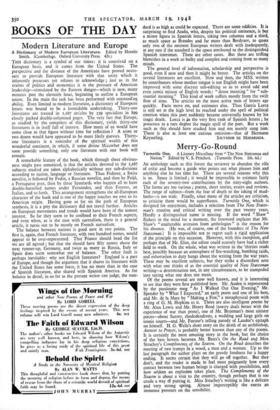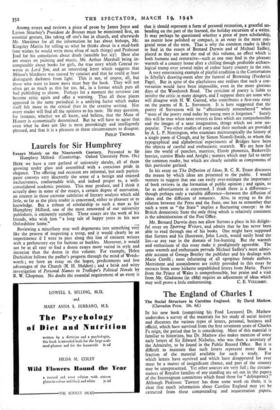Merry-Go-Round
AN anthology such as this forces the reviewer to abandon the role of critic and become a guide who points out what pleases him and anything else he has time for. There are several reasons why this is so. Space is limited ; it would be impossible to estimate fairly each of the seventy-two contributions by the sixty-eight authors. The forms are too various ; poems, short stories, essays and reviews. The range of subject—from the fear of death to the taking of mud- baths—is too wide. Finally, since many of the articles are criticism, to criticise them would be superfluous. Turnstile One, which is designed for enjoyment, includes a selection from The New States- man's creative and critical writing over the past twenty years. Hardly a distinguished name is missing. If the word " Shaw " flickers in the mind for a moment, the foreword explains that Mr. Shaw's " unalterable aversion from anthologies " is the reason for his absence. (He was, of course, one of the founders of The New Statesman.) It is impossible not to regret such a rigid application of the principle on this occasion. However, with this exception, and perhaps that of Mr. Eliot, the editor could scarcely have had a richer field to work. On the whole, what was written in the 'thirties reads best, possibly because an atmosphere of fire-watching, bombing raids, and exhortation to duty hangs about the writing from the war years. These may be excellent subjects, but they strike a discordant note with what one thinks of as the essential quality of New Statesman writing—a determination not, in any circumstances, to be stampeded into saying what one does not mean.
Of the poems several are now well known, and it is interesting to see that they were first published here. Mr. Auden is represented by the passionate song " As I Walked Out One Evening," Mr: Spender by " What I Expected," an early poem and one of his best, and Mr. de la Mare by " Making a Fire," a metaphysical poem with a ring of G. M. Hopkins to it. There are also intelligent poems by" Mr. Alun Lewis and Mr. Henry Reed (poetry deals better with the- experience of war than prose), one of Mr. Betjeman's most sinister pieces—about Surrey, rhododendrons, a wedding and large girls on tennis courts—and Mr. Forster's telling parody of Landor's epitaph on himself. H. G. Wells's short story on the death of an archbishop, Answer to Prayer, is probably better known than any of the poems. It is certainly the most amusing story in the book, but the choice of the best hovers between Mr. Bates's On the Road and Miss Strachey's Cornplimentsrof the Season. On the Road describes the meeting of two tramps in a wood, a man and a woman. Up to the last paragraph the author plays on the greedy fondness for a happy ending. It seems certain that they will go off together. But they don't, and the reader is made to feel most poignantly how every. contact between two human beings is charged with possibilities, and how seldom an explositon takes place. The Compliments of the Season is about a visit to the country, though perhaps that is too crude a way df putting it. Miss Strachey's writing is like a delicate and very strong spring. Almost imperceptibly she exerts an immense pressure on the sensibility.
Among essays and reviews a piece of prose by James Joyce and Lytton Strachey's President de Brosses must be mentioned first, an essential gesture, like taking off one's hat in church, and afterwards Mr. Mortimer for all the information he has about bishops, Mr. Kingsley Martin for telling us what he thinks about in a mud-bath (one wishes he would write more often of such things) and Professor Joad for his consolation about death (sensible but icy). Here also are essays on painting and music, Mr. Arthur Marshall being in- comparable about books for girls, the true story which Conrad re- wrote as Lord Jim, and an interesting letter which suggests that Milton's blindness was caused by cataract and that he could at least distinguish darkness from light. This is not, of course, all, but those who want to know more must buy the book. They will not often get as much as this for los. 6d., in a format which puts all bad publishing to shame. Perhaps for a moment the reviewer can become critic again and offer a warning. That all these pieces appeared in the same periodical is a unifying factor which makes itself felt more in the critical than in the creative writing. Not every reader will find all the opinions to his taste. He may question, for instance, whether we all know, and believe, that the Muse of History is economically determined. But he will have to agree that even what he does not like is most provokingly and intelligently phrased, and that it is a pleasure in these circumstances to disagree.
PHILIP TROWER.































 Previous page
Previous page